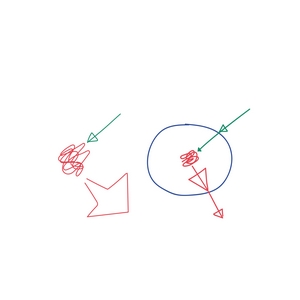In freeing ourselves from a dysregulated nervous system, an important step is learning how
to reframe our experiences. We need to do this so that we are no longer subject to learned
ways of behaviour that negatively impact our lives and the relationships we have with others.
The goal is to go from the diagram on the left below to the one on the right.

In the diagram on the left, in which our baggage is represented by the red squiggle, triggers
are the green arrow, and our reaction is the red arrow, you can see a dysregulated nervous
system – one that overreacts to the trigger. The diagram on the right represents a nervous
system that is well regulated as a result of using boundaries and containment.
To reframe our experiences, we must bring attention to our triggers, our baggage, and our
reactions. It’s easy to consider ourselves the victim in situations that trigger us and make us
feel unsafe, but there is very little we can do to control what life throws at us. What we can
do, however, is use boundaries and containment to lessen the impact that our triggers have
on our baggage. When we do this, we create something like a shield around that vulnerable,
wounded part of ourselves.
Boundaries and containment are a good idea, in theory. The problem is, they can be a pain to
apply consistently in the real world in practice. It means looking after yourself. It means
trying your best not to do any damage to other people in the process. Both can be surprisingly
hard to do, particularly if your nervous system is dysregulated. Others’ behaviour can alarm
us, and our own behaviour can frighten us too. If we make a dent in filtering out some of that
alarm and fear, then our nervous systems get to experience the same events in relationships
with others in a safer way.
This gives us some breathing space, allowing us to look within and consider what our triggers
actually are, what is the baggage they’re provoking, and how we react to it all. If we
constantly see ourselves as the victim, it’s unlikely that we will find the strength and
motivation to change. But if towards taking responsibility and autonomy of our nervous systems, we can begin to shift our perspective in a way that allows us to understand our experiences and reframe them so that baggage from the past doesn’t run our lives in the present.
You can download this post in a handy 2-page PDF to print and share with friends, family, clients or colleagues. Follow this link to download now.
You can buy a copy of The Invisible Lion now on kindle or paperback from your local Amazon store. Just click here to buy now.


